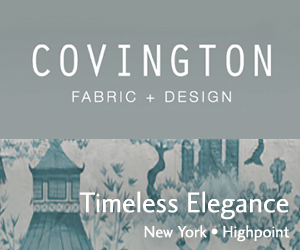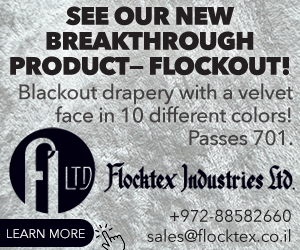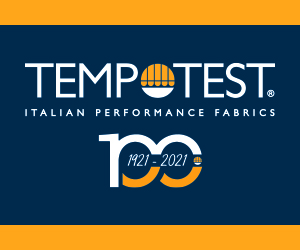TSG Diversifies to Overcome Sluggish U.S. Economy
March 15, 2004
PHILADELPHIA, Pennsylvania and HICKORY, North Carolina—By focusing on value added services like warehousing, engraving, embossing, laminating and specialized chemical applications, TSG Incorporated is growing in spite of a difficult economy, said Jack Rosenstein, a principal of the 102 year old firm now in its fifth generation of family ownership.
Compared to just five years ago, TSG's customer base is extremely diversified, well beyond its core upholstery finishing business. The company is an aggressive marketer and has been growing, not just maintaining its presence in the fabric industry. It is doing so by supplying specialized finishes for an ever-expanding range of woven and nonwoven textiles that go into a variety of products used outside the home furnishings industry. Products as diverse as medical gowns, surgical wraps and drapes, automotive interiors, engine compartment barriers and insulators, air and water filters, roofing felts, insulation and gypsum board facers are not uncommon recipients of TSG finishes these days.
TSG however, has by no means abandoned its core business of commission finishing for the home and contract furnishings industry. They continue to expand their Defend® line of soil and stain resistant finishes as well as improved anti-stain treatments for upholstery and wall coverings. "Our Defend® line is growing," said Bob Beaty, Vice President of sales. "Today, consumers are more conscious of fabric cleanability than ever before. It's no longer just a matter of water beading up on your sofa cushion. Durable stain and soil release in addition to anti-microbial properties have become important benefits to the upholstery fabrics that we offer our customers."
TSG expects 2004 to be another growth year and an improvement over 2003. In addition to upholstery, medical nonwovens, automotive and construction fabrics, TSG is growing in the industrial fabric business where it supplies high performance coatings for solution dyed acrylic fabrics used in decorative awnings and outdoor furniture. These coatings provide a whole range of important attributes like mold and mildew resistance, water and moisture holdout, and fire retardancy.
TSG is also expanding its engraving and embossing business as more customers discover the benefits of adding dimension and variety to solid color knit, flock, suede and pile fabrics. According to Rosenstein, "people eventually get tired of plain, solid color fabrics. Through embossing, you can take a common inventory of monotone fabrics and create additional looks without expanding your SKUs."
"We're doing more business engraving and embossing for home furnishings and specialty decorative products like picture frames, lampshades and pillows," Rosenstein said. "We have the ability to both engrave and emboss in-house. This gives us an entrée to many end-use or niche markets. We can emboss just about any pattern imaginable, but only onto fabrics constructed primarily of thermoplastic fibers. Real suede and leather can also be embossed because of their inherent capacity to be molded through heat and pressure and then take a set. Our wide variety of house patterns available enables us to customize many types of commodity fabrics and make them unique in smaller markets."
Rosenstein also pointed out that many automobile manufacturers like to use embossed patterns on interior seating surfaces, door panels, quarter panels and even headliner fabric. On automotive seating, the embossed design is often used as an accent piece in the center cushion, surrounded on all sides with a plain version of the same fabric applied to the bolsters. On some car models, this concept is reversed. "The same idea is now being applied to upholstered furniture as well," he said.
According to Rosenstein, in the old days, engraving/embossing was an expensive and time-consuming proposition that frequently limited its use to high volume, commodity fabrics only. "With our new engraving and embossing technology, we can now go from pattern submission to embossed samples in a matter of days. We accomplish this by first cutting the customer's pattern on to a 6" x 6" square plate and then making embossed samples with a mini-press. After these small samples are approved, full width engraved rolls frequently take less than two weeks to complete and are inexpensive enough to justify low volume, full width fabric runs of about 500-1000 yards. While 6"x 6" pressings are preferred by the converter, our automotive customers generally prefer larger format pressings on our 24"x 24" inch size sample press", he added.
Finally, Beaty pointed out that TSG is rapidly filling its new automated warehouse in North Carolina. "We're now storing more fabrics from foreign suppliers than ever before. These are people who recognize the need for a reliable partner in the USA who is not a competitor." He further explained, "manufacturers from Turkey, India or China as well as some European mills can ship a container load of goods to TSG and we'll store it, bar-code it and ship it out to the customer either as a full piece or as a cut. This is an essential service the foreign supplier can provide through us."
Compared to just five years ago, TSG's customer base is extremely diversified, well beyond its core upholstery finishing business. The company is an aggressive marketer and has been growing, not just maintaining its presence in the fabric industry. It is doing so by supplying specialized finishes for an ever-expanding range of woven and nonwoven textiles that go into a variety of products used outside the home furnishings industry. Products as diverse as medical gowns, surgical wraps and drapes, automotive interiors, engine compartment barriers and insulators, air and water filters, roofing felts, insulation and gypsum board facers are not uncommon recipients of TSG finishes these days.
TSG however, has by no means abandoned its core business of commission finishing for the home and contract furnishings industry. They continue to expand their Defend® line of soil and stain resistant finishes as well as improved anti-stain treatments for upholstery and wall coverings. "Our Defend® line is growing," said Bob Beaty, Vice President of sales. "Today, consumers are more conscious of fabric cleanability than ever before. It's no longer just a matter of water beading up on your sofa cushion. Durable stain and soil release in addition to anti-microbial properties have become important benefits to the upholstery fabrics that we offer our customers."
TSG expects 2004 to be another growth year and an improvement over 2003. In addition to upholstery, medical nonwovens, automotive and construction fabrics, TSG is growing in the industrial fabric business where it supplies high performance coatings for solution dyed acrylic fabrics used in decorative awnings and outdoor furniture. These coatings provide a whole range of important attributes like mold and mildew resistance, water and moisture holdout, and fire retardancy.
TSG is also expanding its engraving and embossing business as more customers discover the benefits of adding dimension and variety to solid color knit, flock, suede and pile fabrics. According to Rosenstein, "people eventually get tired of plain, solid color fabrics. Through embossing, you can take a common inventory of monotone fabrics and create additional looks without expanding your SKUs."
"We're doing more business engraving and embossing for home furnishings and specialty decorative products like picture frames, lampshades and pillows," Rosenstein said. "We have the ability to both engrave and emboss in-house. This gives us an entrée to many end-use or niche markets. We can emboss just about any pattern imaginable, but only onto fabrics constructed primarily of thermoplastic fibers. Real suede and leather can also be embossed because of their inherent capacity to be molded through heat and pressure and then take a set. Our wide variety of house patterns available enables us to customize many types of commodity fabrics and make them unique in smaller markets."
Rosenstein also pointed out that many automobile manufacturers like to use embossed patterns on interior seating surfaces, door panels, quarter panels and even headliner fabric. On automotive seating, the embossed design is often used as an accent piece in the center cushion, surrounded on all sides with a plain version of the same fabric applied to the bolsters. On some car models, this concept is reversed. "The same idea is now being applied to upholstered furniture as well," he said.
According to Rosenstein, in the old days, engraving/embossing was an expensive and time-consuming proposition that frequently limited its use to high volume, commodity fabrics only. "With our new engraving and embossing technology, we can now go from pattern submission to embossed samples in a matter of days. We accomplish this by first cutting the customer's pattern on to a 6" x 6" square plate and then making embossed samples with a mini-press. After these small samples are approved, full width engraved rolls frequently take less than two weeks to complete and are inexpensive enough to justify low volume, full width fabric runs of about 500-1000 yards. While 6"x 6" pressings are preferred by the converter, our automotive customers generally prefer larger format pressings on our 24"x 24" inch size sample press", he added.
Finally, Beaty pointed out that TSG is rapidly filling its new automated warehouse in North Carolina. "We're now storing more fabrics from foreign suppliers than ever before. These are people who recognize the need for a reliable partner in the USA who is not a competitor." He further explained, "manufacturers from Turkey, India or China as well as some European mills can ship a container load of goods to TSG and we'll store it, bar-code it and ship it out to the customer either as a full piece or as a cut. This is an essential service the foreign supplier can provide through us."
















